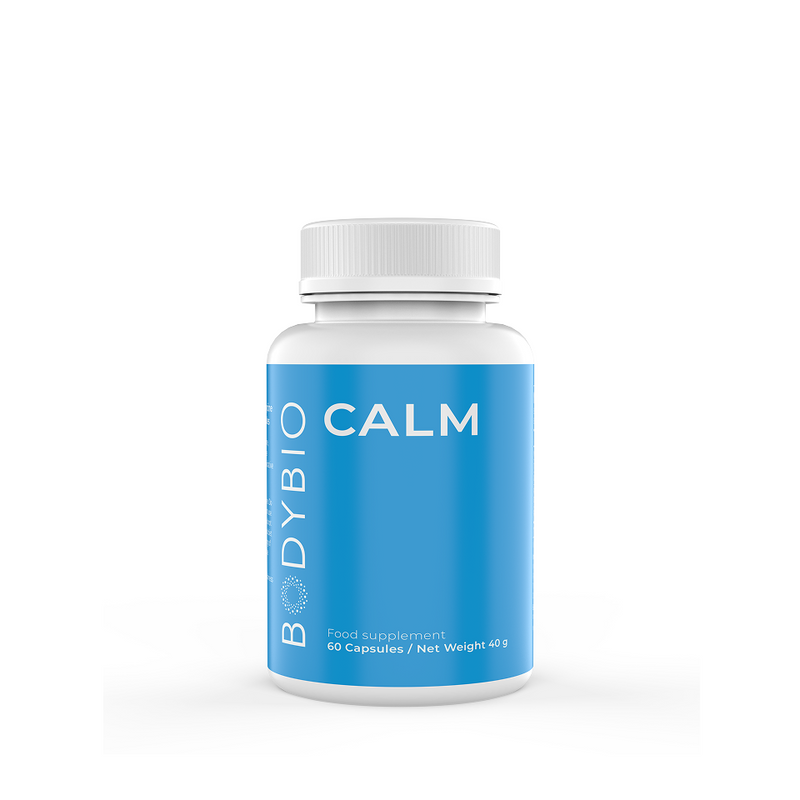Calm: A Symphony of Stress-Relieving Ingredients
When consulting clients in my private practice, I look for the lowest common denominator of supplements that their body needs to be optimally healthy, and when selecting those supplements, I look for the least amount of ingredients that will get me that desired outcome. As a rule of thumb, the more ingredients a supplement contains, the more likely it is that there will be a mechanism of action that is counter-productive, that disrupts another process or triggers an unfavorable genetic tendency.
This is a common problem I have noticed when suggesting stress support formulas. Standard supplements are often overloaded with “healthy” ingredients that may perform well for some, but can trigger adverse effects in others. A few popular mainstays are licorice root, soy lecithin, adaptogenic mushrooms, and turmeric. My years of clinical experience have led me to believe that, for many people, these ingredients can act as a tripwire for unfavorable genetic expressions, resulting in poor assimilation of a supplement, the slowing of detoxification channels, and increased pathogenic loads.
It can be difficult to interpret the subtle warnings the body gives us when a biological process is “off”. Something as innocuous as a recurrent runny nose could be a sign that your body is having difficulty assimilating a certain ingredient, or your liver is backed up. My job as a practitioner is to read your body holistically and to examine the ingredients in the supplements I suggest, searching for interactions and the potential for epigenetic twists and turns.
Yes, licorice root can help heal the gut, but it also increases cortisol – not good for those of us trying to soothe our HPA axis. Phosphatidylserine is a fantastic phospholipid for adrenal and cell-membrane support, but is often derived from soy lecithin - soy is a top-five allergen. Adaptogenic mushrooms may promote relaxation for some, but I have found them to be firestarters for mold-driven pathogens like candida. Turmeric, touted as a superfood detoxifier, can actually back up the lymphatic system and slow phase 1 liver detox for those with certain genetic predispositions.
When creating Calm, BodyBio looked to me to orchestrate the “what” and the “why” of a gene-smart stress support supplement, incorporating The Cochrane Method approach.
My solution? Keep it simple. A good formula has an elegance to it. Each ingredient should work synergistically with every other ingredient in the blend to create a melody that the body responds to and resonates with. This means avoiding any ingredient that could create a potential epigenetic firestorm. Steering away from potential genetic firestarters like licorice root, soy, adaptogenic mushrooms, turmeric and sulfur-based compounds is a great start for many of us.
Designed with common genetic sensitivities in mind, Calm contains just five stress-relieving ingredients: rhodiola rosea, phosphatidylserine, taurine, glycine and manganese.
Rhodiola rosea is an adaptogenic herb useful for managing stress and mental fatigue (14, 15, 16). It also has the potential to protect athletes from exercise-induced susceptibility to infections by reducing virus replication, as well as providing other benefits such as improving inflammation and depression (17).
Phosphatidylserine is an amino acid derivative that helps maintain the structure of cell membranes, improves memory and blunts the pituitary-adrenal reactivity hormones, ACTH and cortisol, in response to emotional or mental stress (1). Phosphatidylserine also may also positively impact Alzheimer’s associated symptoms (2), slow age-related cognitive decline (3), combat depression, aid ADHD symptoms (4), and support athletic performance (5). Importantly, the phosphatidylserine in Calm is soy-free and derived from sunflower seed lecithin.
Taurine, an amino acid important for cell health, helps to regulate multiple biological processes in the body such as anti-oxidation, detoxification, neuromodulation, osmoregulation, anti-inflammation, cholestasis prevention, the conjugation of bile acids, and thermoregulation (18).
The amino acid glycine is involved in a wide range of functions including digestion, inflammation, depression, and overall metabolic function (10, 11, 12, 13). As the work of Dr. Stephanie Seneff has illuminated, widespread exposure to the herbicide glyphosate has impaired our ability to properly digest and assimilate proteins. One particularly harmful way that glyphosate disrupts this process is by creating mimic analogues of the essential amino acid glycine. Tricked by these mimics, our body believes that it has already produced sufficient glycine and ceases production of real glycine, a deficit that impairs our ability to properly methylate and digest protein (6).
Lastly, manganese is an essential metal necessary for the development, growth, and normal functioning of our bodies. Crucially, manganese has been also shown low to lower histamine levels (9). Manganese deficiency is associated with reduced fertility, ovarian and testicular dysfunction, PMS symptoms, and defective insulin production (7, 8).
What this unique stress support supplement really speaks to is an approach through which we can address the daily physical and emotional challenges that today’s world poses. Between compound stressors like the standard American lifestyle, the depletion of nutrients in our food sources, and the increasing threats to our mental health propagated by a lack of community and connection to self, few supplements provide the kind of holistic, big-picture support we need.
Informed by the Cochrane Method, Calm looks towards the larger construct of modulating neurotransmitter response, protein metabolism, histamine levels, and the interplay of our genetic tendencies with environment, emotion and food.
Calm is designed not only to help you achieve homeostasis – but to help you maintain a healthy stress response during the homeodynamics of everyday life. Our bodies are always in a state of flow and change, and adapting to the ever-evolving circumstances of life is a dance. A true gene-smart solution for stress, Calm is a beautiful symphony that can help teach you the steps.1) Hellhammer, J., E. Fries, C. Buss, V. Engert, A. Tuch, D. Rutenberg, and D. Hellhammer. “Effects of soy lecithin phosphatidic acid and phosphatidylserine complex (PAS) on the endocrine and psychological
responses to mental stress.” Stress 7, no. 2 (2004): 119-126.
2) Hashioka, Sadayuki, Youn-Hee Han, Shunsuke Fujii, Takahiro Kato, Akira Monji, Hideo Utsumi, Makoto Sawada, Hiroshi Nakanishi, and Shigenobu Kanba. “Phosphatidylserine and phosphatidylcholine-containing liposomes inhibit amyloid β and interferon-γ-induced microglial activation.” Free Radical Biology and Medicine 42, no. 7 (2007): 945-954.
3) Kato-Kataoka, Akito, Masashi Sakai, Rika Ebina, Chiaki Nonaka, Tsuguyoshi Asano, and Takashi Miyamori. “Soybean-derived phosphatidylserine improves memory function of the elderly Japanese subjects with memory complaints.” Journal of clinical biochemistry and nutrition 47, no. 3 (2010): 246-255.
4) Hirayama, S., K. Terasawa, R. Rabeler, T. Hirayama, T. Inoue, Y. Tatsumi, M. Purpura, and R. Jäger. “The effect of phosphatidylserine administration on memory and symptoms of attention-deficit hyperactivity disorder: a randomized, double-blind, placebo-controlled clinical trial.” Journal of human nutrition and dietetics 27, no. s2 (2014): 284-291.
5) Parker, Adam G., Josh Gordon, Aaron Thornton, Allyn Byars, John Lubker, Michelle Bartlett, Mike Byrd et al. “The effects of IQPLUS Focus on cognitive function, mood and endocrine response before and following acute exercise.” Journal of the International Society of Sports Nutrition 8, no. 1 (2011): 16.
6) Seneff, Stephanie, and Laura F. Orlando. "Glyphosate substitution for glycine during protein synthesis as a causal factor in Mesoamerican Nephropathy." J Environ Anal Toxicol 8.1 (2018): 541.
7) Shamberger, Raymond J. “Calcium, magnesium, and other elements in the red blood cells and hair of normal and patients with premenstrual syndrome.” Biological trace element research 94, no. 2 (2003): 123-129.
8) Penland, James G., and Phyllis E. Johnson. “Dietary calcium and manganese effects on menstrual cycle symptoms.” American journal of obstetrics & gynecology 168, no. 5 (1993): 1417-1423.
9) Foreman, J. C., and J. L. Mongar. “The action of lanthanum and manganese on anaphylactic histamine secretion.” British journal of pharmacology 48, no. 3 (1973): 527-537.
10) Wang, Weiwei, Zhenlong Wu, Gang Lin, Shengdi Hu, Bin Wang, Zhaolai Dai, and Guoyao Wu. “Glycine Stimulates Protein Synthesis and Inhibits Oxidative Stress in Pig Small Intestinal Epithelial Cells, 2.” The Journal of nutrition 144, no. 10 (2014): 1540-1548.
11) McCarty, Mark F., and James J. DiNicolantonio. “The cardiometabolic benefits of glycine: Is glycine an ‘antidote’to dietary fructose?.” (2014): e000103.
12) Altamura, Carlo, Michael Maes, Jin Dai, and H. Y. Meltzer. “Plasma concentrations of excitatory amino acids, serine, glycine, taurine and histidine in major depression.” European Neuropsychopharmacology 5 (1995): 71-75.
13) McCarty, Mark F., and James J. DiNicolantonio. “The cardiometabolic benefits of glycine: Is glycine an ‘antidote’to dietary fructose?.” (2014): e000103.
14) Palmeri, Agostino, Leonardo Mammana, Maria Rosaria Tropea, Walter Gulisano, and Daniela Puzzo. “Salidroside, a bioactive compound of rhodiola rosea, ameliorates memory and emotional behavior in adult mice.” Journal of Alzheimer’s Disease 52, no. 1 (2016): 65-75.
15) Xia, Nan, Jie Li, Hongwei Wang, Jian Wang, and Yangtian Wang. “Schisandra chinensis and Rhodiola rosea exert an anti-stress effect on the HPA axis and reduce hypothalamic c-Fos expression in rats subjected to repeated stress.” Experimental and therapeutic medicine 11, no. 1 (2016): 353-359.
16) Panossian, Alexander, Georg Wikman, Punit Kaur, and Alexzander Asea. “Adaptogens exert a stress-protective effect by modulation of expression of molecular chaperones.” Phytomedicine 16, no. 6-7 (2009): 617-622.
17) Ahmed, Maryam, Dru A. Henson, Matthew C. Sanderson, David C. Nieman, Jose M. Zubeldia, and R. Andrew Shanely. “Rhodiola rosea exerts antiviral activity in athletes following a competitive marathon race.” Frontiers in nutrition 2 (2015): 24.
18) Marcinkiewicz, Janusz, and Ewa Kontny. “Taurine and inflammatory diseases.” Amino acids 46, no. 1 (2014): 7-20.





